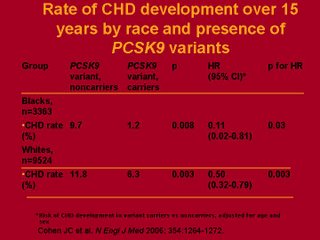The Benefits of Long Term (15 Years) LDL-C Reduction
There is little doubt that lowering LDL-Cholesterol, lessens CAD. This fact has been stated and studied over and over again. In fact, as we now all know, there can no longer be any LDL-cholesterol lowering trial pitting statins (any other agents) against placebo. Placebo is deemed to be unacceptable therapy in individuals at risk of CAD. That is why, all cholesterol lowering trial must at least have statin on one arm. We are also concerntrating alot on the dose of statins, the superstatins in their superdose against the moderate statins in their moderate doses. No one had ever done a trial of LDL-cholesterol lowering over long intervals. Most of the statin trials are of 3-5 years, where so far the CAD reduction has been moderate at best.
It is good news that on the 23rd of March 2006 issue of NEJM, Dr J.Cohen and colleaques of the Texas Southwestern medical center, Dallas (incidentally, the same medical center of 1985 Nobel laureate Brown and Goldstein), published their findings on individuals with the PSCK9 genetic variant. The PSCK9 genetic variants seem to confer lower LDL-cholesterol levels.
Their study is part of the longitudinal "Atherosclerosis Risk in Communities" or ARIC study. They studied 12,887 subjects (black and white) with the PSCK9 genetic variant. There were 2.6% blacks and 3.2% of whites who had a mutation of the PSCK9 gene. The 2.6% of blacks had 28% lower baseline LDL-C when compared to those blacks without the mutation. As for the whites, 3.2% of them had the gene mutation and their LDL-Cholesterol levels were 15% lower.
However, after 15 years, this 28% lower LDL-C in the blacks, translated to a 89% CAD reduction. In the whites, the 15% LDL-C reduction translated to a 47% reduction. Perhaps this result will give us a clue the LDL-cholesterol is not the only factor affecting CAD incidences. A fact which we now know well (especially if you belief in the inflammatory theory of Atherosclerosis). What is equally, if not more important is that long term (15 yrs) LDL-c lowering may have greater benefit than short term (5 yrs). Perhaps someone taking a moderate LDL-C lowering agent, when taken over 10-15 years, may have the same, if not better CAD reduction when compared to high dose superstatins with it's risk of side-effects. This statement, if taken too far may encourage us to give statins to children and adolescents, a strategy with potential mental problems.
Obviously, more work needs to be done, regarding the role of 15 years of superstatins?. There is so much more to learn about the long term effects of severe LDL-cholesterol lowering.
No comments:
Post a Comment